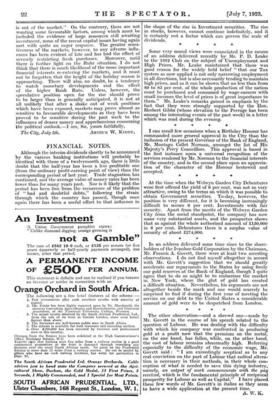FINANCIAL NOTES.
Although the interim dividends shortly to be announced by the various banking institutions will probably be identical with those of a twelvemonth ago, there is little doubt that the half-year has been a less profitable one (from the ordinary profit-earning point of view) than the corresponding period of last year. Trade stagnation has continued, and the average value of money rates has been lower than for many years past. Nor is it likely that the period has been free from the recurrence of the problem of "bad and doubtful debts," following the strain through which the country has passed, though once again there has been a useful offset to that influence in the shape of the rise in Investment securities. The rise in stocks, however, cannot continue indefinitely, and it is certainly not a factor which can govern the scale of dividends.
Some very sound views were enunciated in the course of an address delivered recently by Mr. P. D. Leake to the 1912 Club on the subject of Unemployment and High Prices. Mr. Leake maintained that there was good reason for the widely held belief "that our Tax system as now applied is not only narrowing employment in all directions, but is also necessarily tending to maintain high prices, and as it can be shown that no less than from 80 to 85 per cent, of the whole production of the nation must be purchased and consumed by wage-earners with small incomes the level of prices is of great importance to them." Mr. Leake's remarks gained in emphasis by the fact that they were strongly supported by the Hon. Herbert Gibbs (whose elevation to the Peerage has been among the interesting events of the past week) in a letter which was read during the evening.
I can recall few occasions when a Birthday Honour has commanded more general approval in the City than the inclusion of the present Governor of the Bank of England, Mr. Montagu Collet Norman, amongst the list of His Majesty's Privy Councillors. This approval is based in the first instance upon a universal recognition of the services rendered by Mr. Norman to the financial interests of the country, and in the second place upon an apprecia- tion of the character of the Honour bestowed and accepted.
At the time when the Welwyn Garden City Debentures were first offered the yield of 6 per cent, was not so very attractive, owing to the terms on which it was possible to obtain Government securities. To-day, however, the position is very different, for it is becoming increasingly difficult to secure 6 per cent. Investments with fair security. Apart from the merits of the Welwyn Garden City from the social standpoint, the company has now some very substantial assets, and the prospectus shows that as against the whole authorized amount of 1150,000 in 6 per cent. Debentures there is a surplus value of security of about £274,000.
In an address delivered some time since to the share- holders of the Ivanhoe Gold Corporation by the Chairman, Mr. Francis A. Govett, there were at least two arresting observations. I do not find myself altogether in accord with Mr. Govett's suggestion that we should greatly accelerate our repayments to the States by using freely our gold reserves at the Bank of England, though I quite agree that to do so might be to embarrass the market in New York, where the glut of gold has created a difficult situation. Nevertheless, his arguments are not altogether beside the mark and one would scarcely be surprised to find if during the first year of meeting the service on our debt to the United States a considerable amount of gold were to be despatched from London.
The other observation—and a shrewd one—made by Mr. Govett in the course of his speech related to the question of Labour. He was dealing with the difficulty with which his company was confronted in producing gold at a profit now that the premium on the metal, on the one hand, has fallen, while, on the other hand, the cost of labour remains abnormally high. Referring especially to the difficulty of the economic wage, Mr, Govett said : "I am exceedingly sceptical as to any real conviction on the part of Labour that radical altera- tion is necessary in their methods, in their whole con- ception of what is needed to save this dying industry, namely, an output of work commensurate with the pay received, which is the fundamental principle of reciprocal prosperity for Labour as well as Capital." I have placed these few words of Mr. Govett's in italics as they seem to have a wide application at the present time.
A. W. K.














































 Previous page
Previous page